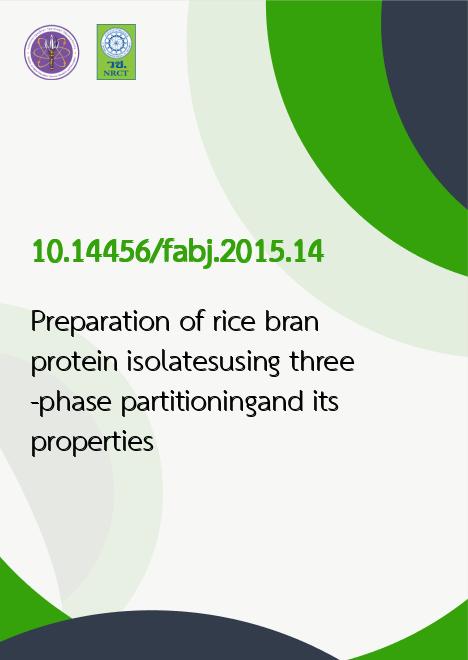
|
Preparation of rice bran protein isolatesusing three-phase partitioningand its properties |
|---|---|
| รหัสดีโอไอ | |
| Creator | Suphat Phongthai and Saroat Rawdkuen |
| Title | Preparation of rice bran protein isolatesusing three-phase partitioningand its properties |
| Publisher | Faculty of Agro-Industry |
| Publication Year | 2558 |
| Journal Title | Food and Applied Bioscience |
| Journal Vol. | 3 |
| Journal No. | 2 |
| Page no. | 137-149 |
| Keyword | Three-phase partitioning, Rice bran,Proteinisolates, Protein hydrolysates, Antioxidant activities |
| URL Website | www.tci-thaijo.org/index.php/fabjournal |
| Website title | www.tci-thaijo.org/index.php/fabjournal/article/view/78186 |
| ISSN | 2286-8615 |
| Abstract | Rice bran is an economicalsource of natural plant-basedprotein. Nowadays, there are many inventions for trying to extract rice bran protein. However, the methods for recoveringprotein from the extract usually provide low yield. So, the application of three-phase partitioning(TPP)was studied. To recover the proteinsfrom crude rice bran extract, TPPcondition including the ratio of t-butanol to crude rice bran extract and the concentration of ammonium sulfate was optimized.The optimalcondition achievingthe highest rice bran protein isolates (RBPI)recovery (98.59?3.52%) wasthe ratio of t-butanol to crude rice bran extract of 2.0:1.0with 40%of ammonium sulfate. Molecular weight (MW) of rice bran protein hydrolysates (RBPH)obtained by usingcrude enzyme from papaya latex(activity=8,658.67?44.06 Unit/mL) ranged between<7.51 to 31.83 kDa. Thetotal phenolic content (TPC) of RBPI and RBPH was244.93?5.01 and 367.40?4.68 ?gGallic acid/mL, respectively. Moreover, these rice bran proteinsalso showed antioxidants activityin termsofradical scavenging activity(17.84?0.45 to 44.51?0.44%)and ferric reducing activity(584.67?2.65 to 924.33?6.11 ?moLFeSO4/L). According the results, TPP could be used as an alternative method to recover protein with a high yieldand bioavailability properties. |
